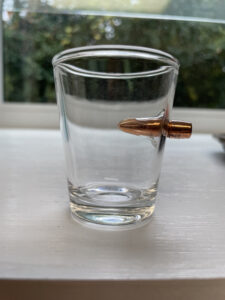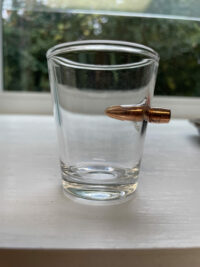Thanks to Rob for sending these to me, I love them.

‘A SHOT OF WHISKEY’
In the old west a .45 cartridge for a six-gun cost 12 cents, so did a glass of whiskey. If a cowhand was low on cash, he would often give the bartender a cartridge in exchange for a drink. This became known as a “shot” of whiskey.
BUYING THE FARM
This is synonymous with dying. During WW-I soldiers were given life insurance policies worth $5,000. This was about the price of an average farm so if you died you “bought the farm” for your survivors.
IRONCLAD CONTRACT
This came about from the ironclad ships of the Civil War. It meant something so strong it could not be broken.
RIFF RAFF
The Mississippi River was the main way of travelling from north to south. Riverboats carried passengers and freight but they were expensive so most people used rafts. Everything had the right of way over rafts which were considered cheap. The steering oar on the rafts was called a “riff” and this transposed into riff-raff, meaning low class.
COBWEB
The Old English word for “spider” was “cob”.
SHIP STATE ROOMS
Travelling by steamboat was considered the height of comfort. Passenger cabins on the boats were not numbered. Instead they were named after states. To this day cabins on ships are called staterooms.
SLEEP TIGHT
Early beds were made with a wooden frame. Ropes were tied across the frame in a crisscross pattern. A straw mattress was then put on top of the ropes. Over time the ropes stretched, causing the bed to sag. The owner would then tighten the ropes to get a better night’s sleep.
SHOWBOAT
These were floating theatres built on a barge that was pushed by a steamboat. These played small towns along the Mississippi River. Unlike the boat shown in the movie “Showboat”, these did not have an engine. They were gaudy and attention grabbing which is why we say someone who is being the life of the party is “showboating”.
OVER A BARREL In the days before CPR, a drowning victim would be placed face down over a barrel and the barrel would be rolled back and forth in an effort to empty the lungs of water. It was rarely effective. If you are over a barrel, you are in deep trouble
BARGE IN
Heavy freight was moved along the Mississippi in large barges pushed by steamboats. These were hard to control and would sometimes swing into piers or other boats. People would say they “barged in”
HOGWASH
Steamboats carried both people and animals. Since pigs smelled so bad they would be washed before being put on board. The mud and other filth that was washed off were considered useless “hog wash”.
CURFEW
The word “curfew” comes from the French phrase “couvre-feu”, which means “cover the fire”. It was used to describe the time of blowing out all lamps and candles. It was later adopted into Middle English as “curfeu” which later became the modern “curfew”. In the early American colonies homes had no real fireplaces so a fire was built in the center of the room. In order to make sure a fire did not get out of control during the night it was required that, by an agreed upon time, all fires would be covered with a clay pot called-a “curfew”.
BARRELS OF OIL
When the first oil wells were drilled, there was no provision for storing the liquid so they used water barrels. That is why, to this day, we speak of barrels of oil rather than gallons.
HOT OFF THE PRESS As the paper goes through the rotary printing press friction causes it to heat upTherefore, if you grab the paper right off the press, it’s hot. The expression means to get immediate information.

